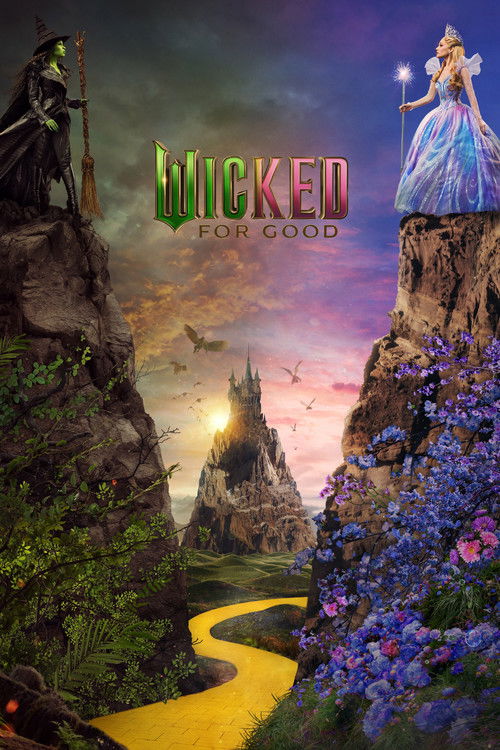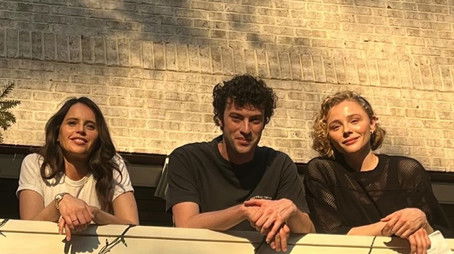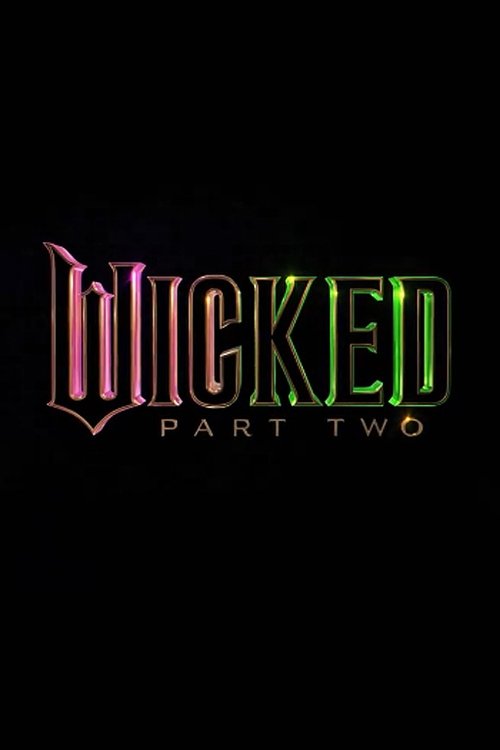
Ask Your Own Question
What is the plot?
Elphaba Thropp opens the story by arriving into the world with skin the color of green copper. Her father, Governor Frexspar Thropp, reacts to her birth with coldness and embarrassment; he ignores her, lavishing his attention instead on his second daughter, Nessarose, who is born with undeveloped legs and requires a wheelchair. At home in their isolated family manor, adults speak in hushed tones about propriety and ambition. Elphaba grows up sharp-tongued and fiercely intelligent, pushed toward solitude by the household's discomfort at her appearance. She reads, practices small charms, and resents the way her father praises Nessarose as fragile and worthy of special care. Nessarose, for her part, accepts the protective deference but also craves independence; she learns to maneuver her chair with stubborn skill.
When the Thropp sisters depart for Shiz University, they step into a bustling campus where magic and academia collide. Elphaba arrives as an outsider, guarded and ready to defend herself. She meets Galinda Upland, the golden-haired, impeccably groomed scion of a prominent family who at first radiates snobbery and popularity. Galinda stumbles into Elphaba's life at a campus mixer and then again at a dance; their first encounters are sharp and full of barbed humor. Across campus, Prince Fiyero Tigelaar arrives as well: relaxed, charming, and immediately connected to Galinda through shared privilege. Fiyero flirts carelessly with both young women, and an awkward triangle forms. Elphaba and Galinda clash and then, in a late-night conversation after a campus dance, find common ground; they begin to stitch an uneasy friendship together.
At Shiz, professors lecture on the ethics of magic, and animals move through campus corridors with unusual intelligence; Elphaba notices this and listens to the animals with quick sympathy. Dr. Dillamond, a goat who teaches Animal Studies, engages students with lessons that stress the equal dignity of nonhuman intellect. He takes particular interest in Elphaba's questions and encourages her to sharpen her outrage at injustice. As Elphaba studies, she discovers that her aptitude for spellwork is both exceptional and dangerous: her fingers trace patterns that older students cannot, and the words in ancient textbooks resonate in her throat. Madame Morrible, a stately and silver-tongued administrator at Shiz, watches Elphaba from the lecture room balcony. Morrible records Elphaba's prowess in her ledger and decides that Elphaba's talent can be used to climb political ladders.
Outside academic walls, a political current moves across Oz. Reports arrive that animals are losing their voices, that their rights are being stripped back, and that those who speak on behalf of animals face dismissal. Dr. Dillamond voices alarm in class and then is suddenly escorted from the lecture hall by city guards; later, the university replaces him with a new instructor who treats animals as property rather than peers. Students whisper that intimidation is sweeping the broader realm: conspiracy and censorship lick at the edges of daily life. Elphaba reacts with fury: she writes petitions, tries to organize protests, and sits in the empty lecture hall to listen to the echo of the goat's last lecture. Her sense of purpose tightens into the belief that someone powerful is orchestrating the quiet erasure of animals' rights. Elphaba tells Galinda that she will find a way to make the Wizard of Oz answer for this, because both she and Dr. Dillamond once assumed the Wizard could remedy such wrongs.
Madame Morrible arranges for an audience in the Emerald City. The Wizard, a man who rules from his throne of glass and brass, cultivates an image of benevolence while keeping a court of advisers who manage his illusions. Morrible escorts Elphaba and Galinda to the capital, and the city's green spires and shining domes reflect their nervous optimism. In the throneroom the Wizard watches Elphaba intently; he speaks in a curious, wavering cadence about destiny and the scarcity of true powerholders. He believes Elphaba's gifts can be harnessed to produce spectacular demonstrations -- displays that will cement his rule across Oz. In a private chamber of the palace, Morrible produces the Grimmerie, an ancient, leather-bound spellbook that holds incantations beyond ordinary training. She tells Elphaba that the Wizard wishes to gauge her capacity by reading aloud a spell. The Grimmerie sits heavy on a marble table; its letters seem to move in the lamplight. Elphaba opens the book with a mixture of dread and duty and lets the syllables fall from her lips.
As Elphaba reads, the chamber's air thickens. The Wizard's guards -- monkey-like creatures kept as foot soldiers -- convulse. Their skin ripples; spines bend. From their shoulders, guttural sounds shift into agonized cries as new membranes push apart and wings tear through flesh. The guards shriek as feathers and sinew emerge, each new limb stretching painfully. Elphaba freezes when she hears the torturous screeching. Morrible's face remains composed, but the edges of her mouth betray a smirk. The Wizard's hand, poised above a brass lever, does not move to stop the transformation. In that instant, Elphaba understands the construction of the court's benevolence: she was lured to conjure real magic that the Wizard cannot perform himself. When the wings finish their formation, the monkey guards stand with a pained, mechanical grace; they fold their wings and present their service-ready posture. Elphaba realizes that the Wizard and Morrible engineered this scene to create a legion of spies and enforcers -- creatures whose wings will carry them to the remotest corners of Oz. By pressing her to speak from the Grimmerie, they extract a unique power that the Wizard later weaponizes. Elphaba's stomach drops as she sees the human cost of the court's illusions.
She confronts Morrible and the Wizard in the palace corridors. She accuses them of condemning animals and converting people into tools. Morrible replies with practiced benevolence: they had needed a catalyst, she says, and Elphaba's talent was a public service. The Wizard, when pressed, tries to charm with rhetoric about maintaining order, about sacrifice for the greater good. Elphaba does not accept this; she demands restitution for Dr. Dillamond and for every creature whose voice has been silenced. The Wizard's smile narrows into menace. He signals to the court, and palace guards move to detain her. Morrible lifts a hand and speaks to the assembled ministers; she frames Elphaba's defiance as dangerous, as evidence that she will use her unpredictable power to upend society. The courtiers nod. The palace's green walls vibrate with murmured assent. Elphaba calculates her options: speak, stay, submit -- or take flight.
Elphaba and Glinda try to leave the Emerald City together. They hurry through back stairwells and servants' corridors, their footsteps echoing as they pass tapestried walls. Elphaba intends to take Glinda with her because she fears losing the one person who now seems to understand her. Glinda hesitates in a sunlit vestibule, torn between the security of palace approval and the fevered conviction in Elphaba's eyes. Elphaba steps onto a balcony, calls to Glinda to come, and produces her broomstick with a steady hand. Her fingers close on the worn handle; she mounts it, the bristles trembling, and she begins the incantation that will lift her into the air. Behind her, she glances back at Glinda and sees confusion carve across her friend's features. The palace guards surge into the courtyard, and Morrible addresses the crowd with a prepared proclamation: Elphaba Thropp, the green-skinned witch, is declared an enemy of Oz. The word wicked lands like a hammer on every ear. The populace turns as one toward the spectacle.
Glinda steps forward and faces the crowd. She looks at Elphaba and then at the Wizard and sees the cost of allegiance. She chooses to stay. She raises her hand not to restrain Elphaba but to calm those assembled, to plead for reason. Elphaba turns the broom's handle with white-knuckled determination. She mutters a spell under her breath. The palace's electric infrastructure -- lamps and conduits that hum with emerald light -- surges. Light flashes through the throneroom windows; filaments crackle. Devices explode in short, controlled bursts. The surge shuts down the palace alarms and the palace's communication towers; it makes the Palace's weaponry flicker like dying fire. The guards stagger, clutching their ears and eyes. The residents of the Emerald City watch in terror and awe as Elphaba's magic ripples outward.
Elphaba lifts from the balcony. She beats the broomstick with a strength honed from years of practice, and the winds open to take her. Her green cloak snaps like a flag. Below, the Wizard snarls, and Morrible furrows her brow at the sight of her plan unraveling. Soldiers point blunted spears skyward; some take shots with crossbows, but the bolts pierce only air and spin away as gusts buffet them. Glinda does not run after Elphaba; she remains in the palace threshold to collect the fragments of the Wizard's propaganda and to watch the people she has known respond to their ruler's duplicity. Elphaba crosses the city walls and vanishes into a storm-dark horizon, pitching herself toward unknown lands with the broomstick as both instrument and escape. As she gains altitude, she shouts a final line of defiance at the Emperor's court and at the wolfish faces of those who called her wicked. Her voice carries, ragged and clear.
When the storm takes her, the sky answers. Lightning forks, and Elphaba rides the updrafts with a controlled ferocity; the broom dips and rises, and the wind tears at the hem of her cloak. Below the Emerald City's citizens stand dumbfounded under the beginning of a public narrative that Madame Morrible and the Wizard will try to control. In the immediate aftermath, Morrible organizes arrests; she spins the tale that Elphaba is a traitor who assaulted the palace and called down the surge. The Wizard issues a public statement, his tone measured and paternalistic, that the city must rally together against chaos. Glinda watches these events and notes, in the particular stillness of the palace foyer, the first fissures in her certainty.
Elphaba's flight ends over a country of rolling plains and dark woods. She navigates by the stars and by instinct, searching for refuge. Her mind cycles through recent betrayals: Dr. Dillamond's removal, the Wizard's manipulation, the way Morrible taught her to read the Grimmerie as if it were a test. She thinks of Nessarose, of the way their father looked at the younger sister with a soft smile, and of the way the world treats those who differ from the norm. She resolves to find a position from which she can act on a larger scale, a place where she can still defend animal rights and expose the Wizard's abuses. She lands in a small, wooded clearing and tucks the broom beneath a bush; she sits with her back against a tree and whispers to herself the next incantation she intends to learn. The film closes on her silhouette against a spreading dawn as she pulls the Grimmerie out, fingers trembling, and turns the pages toward whatever comes next.
Throughout the narrative, Prince Fiyero remains a locus of complicated loyalties: he courts both Glinda and Elphaba at different moments, enchanted by Elphaba's candor and shaken by Glinda's social grace. He watches the Wizard's court and occasionally throws himself into scenes of student revolt at Shiz, but his choices are still forming at the point when Elphaba leaves. Dr. Dillamond's forced removal from Shiz is recorded and protested by classmates, and his absence becomes one of the key grievances that fuels Elphaba's action. Madame Morrible acts as the bridge between the academic world and the imperial court; she orchestrates the meeting in the Emerald City, manipulates public opinion, and participates in the staging that brands Elphaba as wicked. The Wizard positions himself as Oz's paternal overseer while concealing his inability to perform true sorcery; he relies on Elphaba's talents to produce visible miracles and on Morrible to seal narratives.
The film presents these sequences in specific, connected scenes: Elphaba's childhood at the Thropp manor; her arrival at Shiz University and the dance where she and Galinda bond; classroom scenes with Dr. Dillamond and the subsequent removal; Morrible's calculated interest; the journey to the Emerald City; the Grimmerie-reading in the Wizard's private chamber; the visceral transformation of the monkey guards as wings rip from their backs; the confrontation in the palace corridors; the defamation speech where Morrible brands Elphaba wicked; the balcony escape; the palace power surge; and the final airborne flight into the dawn. Each scene discloses concrete actions: the opening of the Grimmerie, the painful growth of the guards' wings, the court's mobilization to detain Elphaba, Glinda's decision to stay, and Elphaba's use of her broom to flee.
The film ends with Elphaba's silhouette receding into the sky, and the Emerald City's citizens and rulers left to contend with the immediate fallout of her departure. The closing frame lingers on Morrible's composed face and on Glinda standing alone in the palace doorway, watching the green-cloaked figure vanish into the distance. The narrative resolves the immediate confrontations -- Elphaba escapes, the Wizard's plan is exposed to her, and the city gears up to pursue the story of the so-called wicked witch -- while leaving larger threads unresolved for whatever comes next. The final image is of Elphaba flying away, Grimmerie in hand, determined to confront the abuses she has seen and to shape the meaning of the label the court has pinned upon her.
What is the ending?
The ending of Wicked: For Good (2025) reveals that Elphaba fakes her death to escape an angry mob, with Fiyero by her side, who has been transformed into the Scarecrow. Glinda confronts and exposes the Wizard as Elphaba's true father and the real villain, banishing him and arresting Madam Morrible. Glinda is left to rule Oz alone, while Elphaba and Fiyero leave Oz together, marking a bittersweet conclusion to their story.
Expanded narrative of the ending scene by scene:
The climax begins as an angry mob rises against Elphaba, the so-called Wicked Witch of the West. The tension escalates to a violent confrontation where it appears Elphaba is killed by the mob. However, this is a ruse; Elphaba uses a hidden trapdoor to fake her death by water, escaping the mob's wrath unseen. Fiyero, who has been magically transformed into the Scarecrow due to a protective spell Elphaba cast earlier, is with her during this escape, symbolizing their inseparable bond despite his altered form.
Meanwhile, Glinda, who has become a celebrated figure of goodness and is preparing for a grand wedding with Prince Fiyero, is haunted by her estrangement from Elphaba. After witnessing the mob's attack, she gathers courage and confronts the Wizard of Oz. In a pivotal revelation, Glinda exposes that the Wizard is Elphaba's biological father, a secret stemming from an affair he had years before. This revelation shatters the public's perception of the Wizard and redefines the narrative of good and evil in Oz.
Glinda then takes decisive action: she banishes the Wizard from Oz and has Madam Morrible arrested for her complicity in the Wizard's schemes. This act restores a semblance of order and justice to Oz, but it also leaves Glinda isolated in her leadership role.
As the dust settles, Elphaba and Fiyero depart Oz together, choosing exile over the corrupted society they leave behind. Glinda remains in Oz, burdened with the responsibility of ruling and the bittersweet knowledge that the true villain was never Elphaba but the Wizard himself.
The fates of the main characters at the story's end are:
- Elphaba: Alive, having faked her death, escapes Oz with Fiyero, free from the mob and the Wizard's control.
- Fiyero: Transformed into the Scarecrow, he leaves Oz with Elphaba, symbolizing their enduring connection despite his changed form.
- Glinda: Left to rule Oz alone, having exposed the Wizard's villainy but burdened by the loss of her friendship with Elphaba and the complexities of leadership.
- The Wizard: Exposed as the true villain and Elphaba's father, he is banished from Oz.
- Madam Morrible: Arrested for her crimes alongside the Wizard.
This ending emphasizes themes of friendship, truth, and the complexity of good versus evil, with the characters' destinies intertwined in a bittersweet resolution that reshapes the Land of Oz forever.
Is there a post-credit scene?
The movie Wicked: For Good (2025) does not have a post-credits scene. After the credits roll, there are no additional scenes or surprises; the film concludes fully before the credits begin. This is consistent with the first part of the Wicked musical adaptation, which also did not include any mid- or post-credits scenes.
What is the nature of the relationship between Elphaba and Glinda in Wicked: For Good?
In Wicked: For Good, Elphaba and Glinda are estranged at the start, living with the consequences of their past choices. Glinda, now a glamorous symbol of Goodness and preparing to marry Prince Fiyero, is haunted by their separation and tries to reconcile Elphaba with The Wizard, but fails. Their fractured friendship becomes central to the story, and they must come together one final time with honesty and empathy to change themselves and Oz for good.
How does the character of Prince Fiyero change throughout the story?
Prince Fiyero is initially Glinda's fiancé, preparing for a spectacular Ozian wedding. However, after Elphaba uses a spell to protect him from harm, he is transformed into the Scarecrow. By the end, Fiyero leaves Oz with Elphaba, indicating a significant transformation in his role and relationship within the story.
What role does Nessarose, Elphaba's sister, play in the plot?
Nessarose, Elphaba's sister, becomes a figure whose safety is threatened as the story unfolds, especially when a girl from Kansas arrives in Oz. Her situation is part of the rising tensions and conflicts that drive the narrative, highlighting the personal stakes for Elphaba and her family.
What is revealed about the Wizard's true identity and his connection to Elphaba?
It is revealed that the Wizard is actually Elphaba's biological father, the result of an affair he had with Melena years earlier. This revelation comes when Glinda confronts the Wizard with evidence, leading to his banishment from Oz and the arrest of Madam Morrible for her crimes.
How does Elphaba's apparent death affect the story and other characters?
Elphaba fakes her death by water using a trapdoor, which leads the citizens of Oz and Glinda to believe she has been murdered by a mob. This event allows Glinda to take control and restore order, but it is bittersweet as Glinda must live with the truth about the Wizard's villainy. Meanwhile, Elphaba escapes with Fiyero, setting the stage for their departure from Oz and the story's resolution.
Is this family friendly?
The movie Wicked: For Good (2025) is rated PG for action/violence, some suggestive material, and thematic material, making it generally suitable for children aged 8 and above with parental guidance advised.
Potentially objectionable or upsetting aspects for children or sensitive viewers include:
- Action and violence: There are scenes involving fantasy action, mild violence such as guards being struck, and chase sequences that may be intense. Some characters experience physical harm like cuts or punches, but gore is mild.
- Thematic material: The film deals with complex themes such as discrimination, bullying (including a character being bullied for their appearance), and persecution, which may be emotionally challenging.
- Suggestive content: There are subtle hints of implied infidelity and some suggestive dancing, but no explicit sexual content or nudity.
- Frightening scenes: Some scenes involve transformations (e.g., flying monkeys undergoing painful changes), explosions, and moments of tension that could be scary for younger children.
- Emotional intensity: The story includes emotional struggles and moments that might require stamina due to the film's length (2 hours 41 minutes).
No explicit nudity, strong language, or drug/alcohol use is reported. Parents are encouraged to consider their child's sensitivity to fantasy violence, emotional themes, and the film's length before viewing.











